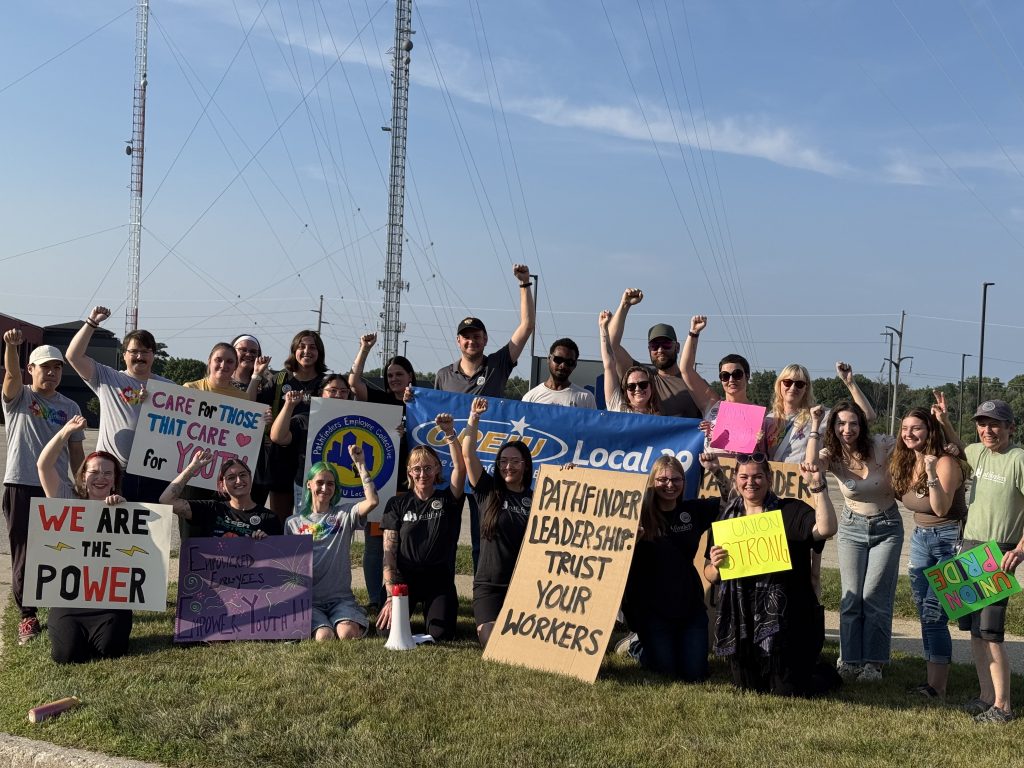Why the Pathfinders Union Struggle Matters
Workers at many nonprofits are under-paid and overworked, with high turnover.
Pathfinders is a mid-sized Milwaukee nonprofit with a budget of about $7 million. On July 31 a group called the Pathfinders Employee Collective announced they were organizing to create a union, and on August 4 held a rally at Estabrook Park to publicize the effort.
Given the size of the organization and the number of workers (less than 50) affected, it’s unlikely to have a great impact on employees rights or benefits in Milwaukee, but the effort is part of a growing national trend that could spread to this city.
“Employees of social justice nonprofit organizations have been unionizing in record numbers,” as a 2023 report on nonprofits funded by the Ford Foundation observed. The report found six major unions, plus affiliates, with active campaigns and contracts across more than 75 nonprofits.
“Roughly two dozen museums have unionized in the past three years,” a story published by the AP reported in 2023. “The Nonprofit Professional Employees Union has grown from 300 workers at 12 organizations in 2018 to 1,500 workers at nearly 50 organizations today. Since 2019 the Nonprofit Employees United has unionized workers at 68 organizations. The NewsGuild-Communications Workers of America went from having five unions recognized in 2019 to 44 today.”
This organizing comes at a time when the nonprofit sector has undergone tremendous growth. Since around 2000, the number of nonprofits in the U.S. has grown by 36% and the number of employees by 30%, according to the Philanthropy Roundtable.
Employees at the Milwaukee Art Museum succeeded in unionizing in 2022, but no other recent efforts by Milwaukee nonprofits come to mind. The Pathfinders group is working with Local 39 of the OPEIU, the Office and Professional Employees International Union, which says it represents more than 103,000 employees in technology, credit unions, hospitals, insurance agencies, colleges and universities, hotels and administrative offices. But it has also created a Nonprofit Employees United Initiative and has helped thousands of nonprofit workers across the country form unions.
“Recently we’ve been working with a lot of nonprofits,” said Evan McKenzie, an organizer for the union, in an interview with Urban Milwaukee. The local is based in Madison and works in nearby cities, including Chicago.
It has helped unionize such Chicago-based nonprofits as the Little Village Environmental Justice Organization, the Uptown People’s Law Center and La Casa Norte, a shelter for homeless women and youth, and the group, Worker Justice Wisconsin in Madison.
As these names suggest, these are groups with a mission to support and empower the less fortunate and are typically doing a good job. “The nonprofits that don’t do good, there is no incentive for workers to stay there,” McKenzie noted. So they are unlikely to try to form a union. Better to just quit.
But just because a nonprofit is doing good doesn’t mean it’s always treating its employees well. Typically nonprofits “don’t have that much oversight and the money can go right to the top,” McKenzie said. “We’re seeing wide gaps between the executive and the workers pay. Blatant malpractice can happen at some of these places.”
And staff can be overworked and treated poorly. “You find much higher staff turnover at nonprofits than in most other industries,” McKenzie noted. “Often the reason for that is burnout of workers and instability at the organization. Nonprofits who come to us can experience high rates of retaliation.”
Pathfinders has a good reputation for the work it does. Founded in 1970 as a shelter for runaway and homeless youth, it provides services like emergency shelters, street outreach and mental health intervention.
But it has a high turnover of employees, Megan Gulland, one of the union organizers, told Urban Milwaukee. She has worked at Pathfinders for eight years and said the turnover has gotten worse in recent years. “Since February, we’ve seen many staff that left or were let go.”
Local 39 offers exact numbers: of 48 non-managerial employee positions at Pathfinders, 13 workers were fired or quit since the beginning of 2025. That’s a turnover of more than one-quarter of its staff in eight months. Gulland attributes that to “the workload, staff burnout and a lack of support from the administration.”
Staff are pushed to work extra hours without pay, she added, and if they have a problem with their direct supervisor, there is no grievance procedure.
As for pay, Gulland said staff have gotten “cost of living adjustments.”
Meanwhile the executive pay has gone up much faster. The organization’s federal 990 tax form shows that its president and CEO Tim Baack saw his compensation rise from $139,850 in 2019 to $192,098 in 2023, rising about twice as fast as the rate of inflation. Senior vice president Marty Alba saw his salary rise from $97,835 to $165,892 during that period, more than triple the rate of inflation.
Nowadays, nonprofit leaders are called CEOs rather than executive directors, giving the organization the feel of a for-profit corporation, and the CEO pay typically rises in line with the group’s budget. It rarely works that way for other workers at the organization. “Often you can only get one raise after your first year and that’s it,” McKenzie says.
The public letter to the company asking it to recognize the union was signed by 33 workers or more than 68% of the staff, but McKenzie says the number signing union cards was even higher than that. Pathfinders has declined to recognize the union and has written what Gulland described as a “union-busting” letter to the staff. As a result there will be a staff vote on whether to form a union on September 3 which will be overseen by the National Labor Relations Board.
Pathfinders did not respond to a request for comment from Urban Milwaukee and has previously declined to speak to the media about the union effort.
Pathfinders has a 15-member board of directors which includes Milwaukee Circuit Court Judge Laura Gramling Perez, but such board members are typically unpaid volunteers whose knowledge of the organization often comes from what their top leader tells them. Baack is one of the 15 board members.
“Nonprofits are run dramatically different from one group to another,” McKenzie says. “But there is often a level of oversight missing.”
The union effort has received support from many elected officials, including seven Milwaukee Common Council members and 37 members of the Wisconsin State Legislature.
“We strongly support the workers of Pathfinders Milwaukee in their move toward forming a union,” the statement by Common Council members declared. “We join in solidarity with them, as they provide valuable services on a daily basis to some of Milwaukee’s most vulnerable youth.”
If you think stories like this are important, become a member of Urban Milwaukee and help support real, independent journalism. Plus you get some cool added benefits.
Murphy's Law
-
Top Health Care Exec Paid $25.7 Million
 Dec 16th, 2025 by Bruce Murphy
Dec 16th, 2025 by Bruce Murphy
-
Milwaukee Mayor’s Power in Decline?
 Dec 10th, 2025 by Bruce Murphy
Dec 10th, 2025 by Bruce Murphy
-
Total Cost of Foxconn Is Rising
 Dec 8th, 2025 by Bruce Murphy
Dec 8th, 2025 by Bruce Murphy























Pathfinders’ employees do essential work with our youth. They deserve union reoresentation.
I support the mission of Pathfinders and have sent them contributions in the past. I also support the workers desire to unionize. They deserve the protection of a union and their demands are reasonable.